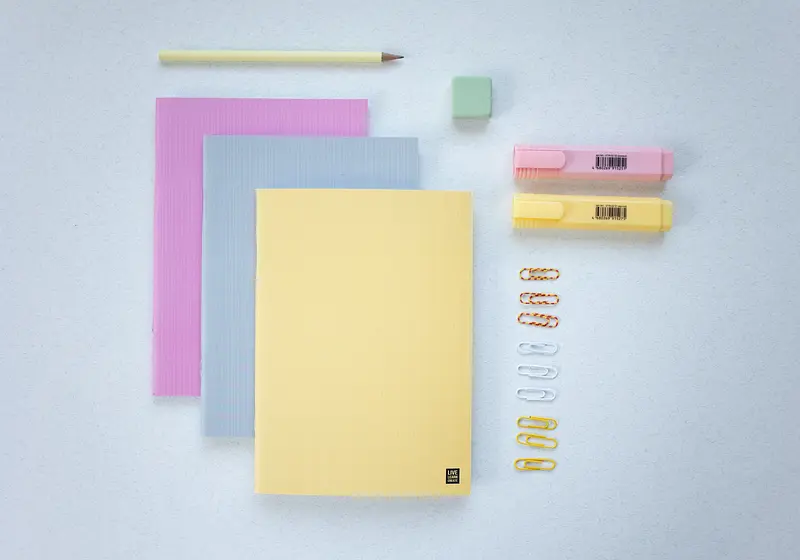Although teen students face many struggles in school life, one issue is unanimous: stress. For many teens, test anxiety and worries about grades dominate their life. However, it doesn't need to be this way!
There are many ways to take a deep breath when it feels like you're drowning in work. With midterms looming around the corner, it's especially important to take care of your mental health. Using these ideas is a great place to start! Although they may not work for everyone, I'm confident that everyone can find their own way to de-stress.
Let us slide into your dms 🥰
Get notified of top trending articles like this one every week! (we won't spam you)1. Practice Deep Breathing
Although this may sound cliché, practicing deep breathing settles your mind and decreases stress. According to the American Institute of Stress, "Deep breathing increases the supply of oxygen to your brain and stimulates the parasympathetic nervous system, which promotes a state of calmness." However, if the mundane in-and-out pattern does not satisfy you, try box breathing! To use this strategy, find something square, such as a frame or book.
Breathe in as you move your eyes along the top of the box, then breathe out as you move your eyes along the sides of the box. Keep going around the box for a couple minutes until your heart rate has decreased a little. Remember to go slowly!
.jpg)
Image Credit: Photo by Fabian Møller on Unsplash

Take the Quiz: What is your IQ level?
Find out how smart you are by taking this quiz!
2. "Five Things You Can See..."
I'd never heard of this trick until I went to see a doctor to chat about anxiety! However, as silly as it may sound, I found this trick helps to ground me in the moment, and keep my thoughts from jumping to the "what-ifs" of the future. According to Mayo Clinic, this tip "can help interrupt unhealthy thought patterns." To use this strategy, look around, and note five things you can see.
For example, your hands, a wall, the back of someone's head, a door, and a lightswitch. Then, look for four things you can hear. For example, your breathing, someone laughing, the wind, and a bell.
Next, move down to three things you can feel. Then, two things you can taste. Finally, one thing you can smell (it could just be the air!). I encourage you to try this trick, as it is simple and can be used anywhere, even in the middle of a crowded school hallway!
3. Attack Negative Thoughts With Positive Ones
Often times when we are anxious about a test, we start having thoughts like "I can't do this," or "This test is impossible." Sound familiar? Instead, start saying to yourself, "I can do this," or "I will do my best to get a good grade." As soon as negative thoughts start creeping in, immediately combat them with a positive thought. According to Mayo Clinic, "When your state of mind is generally optimistic, you're better able to handle everyday stress in a more constructive way." That being said, sometimes negative thinking is not easy to identify. If you aren't sure if your self-talk is negative, try going over this quick checklist:
1. Filtering: You focus on the bad in a situation regardless of any positive aspects. Even if you had a great day at school, you focus on the one annoying girl that sat next to you in bio.
2. Blaming: Instead of being responsible for your own thoughts and feelings, you blame others for something that happened to you. For example, you blame your math teacher for the bad grade on your test. However, take ownership and ask yourself: did I ask questions when I needed help?
Did I do all the homework? Was I paying attention in class?
3. Magnifying: You make a big deal out of minor situations.
4. Catastrophizing: Your go-to is that the worst will happen. You stop at Starbucks on the way to school and they mix up your drink, and you think that the rest of the day is going to be horrible.
Over the course of time, this will make you more confident overall and help you walk in on test day feeling a little better!

Image Credit: Photo by Nathan Dumlao on Unsplash
4. Listen to Calming Sounds
Listening to nature sounds has been proven to decrease stress. According to Health.com, "Overall, nature sounds were associated with a decrease in the body's sympathetic response (that flight-or-fight feeling) and an increase in parasympathetic response- the one that helps the body relax and function in normal circumstances and is sometimes referred to as the 'rest-digest' response." Some great ideas would be listening to the sounds of a river, rain, a thunder storm, or white noise. For others, watching a video to accompany these noises will work even better.
By listening/watching calming senses, you can calm your mind and ground yourself. A great thing about listening to calming noises, is they are a great way to stay relaxed while studying. Unlike music, the noises will not divert attention away from your work, but will still combat stress. I will link a couple of Youtube videos below for you to try!
If this is a strategy that is working for you, consider downloading the app Calm. Calm has a ton of noises and videos for you to use to relax, and has proven to work. On the App Store, Calm currently stands at 4.8 stars with about 1.5 million ratings! Calm includes not only noises, but guided meditations, breathing exercises, stretching videos, music, and "Sleep Stories." Although it does require a subscription for some content, much is still free.
5. Sleep Enough
You may be tempted to pull all-nighters, cramming for your midterms. Although this may happen once, don't turn it into a habit! You need to sleep in order to take on your day with the right foot forward.
The American Academy of Sleep Medicine recommends 8-10 hours for teens aged 13-18. Though for many teens 8-10 hours every night is unrealistic, getting enough sleep trumps any 3 am chemistry session. According to Web MD, "A good night's sleep makes you able to tackle the day's stress more easily. When you're tired, you're less patient and more easily agitated, which can increase stress."
Although you may have a lot of homework that demands you stay up, try to find creative ways to pack it in. (most importantly: turn off your phone! It's probably wasting more time than you're conscious of. Just look at your screen time!) To give you an idea of a crammed schedule that is still able to get enough sleep, I interviewed a productive friend!
3:05pm: Get home from school and eat a snack.
3:30pm: Practice piano.
4:30pm: Do homework.
5:30pm: Eat dinner.
5:45pm: Chinese tutoring.
7:00pm: Swim practice.
9:00pm: Study.
11:00pm: Go to bed.
Of course, everyone's schedule is extremely variable due to household responsibilities, extra-curriculars, and the classes you're taking. However, I hope my friend's schedule was a good framework for you to help schedule your day so you can get to bed on time and decrease stress!

Image Credit: Photo by Kate Stone Matheson on Unsplash
6. Stretch
I'm personally not a fan of yoga, but there are many health benefits. According to Kidshealth.org, "Yoga can help reduce stress because it promotes relaxation, which is the natural opposite of stress. Yoga can benefit three aspects of ourselves that are often affected by stress: our body, mind, and breathing." You don't need to be flexible to do yoga!
Yoga is more than just stretching: it often combines strength work as well. Additionally, there are many types of yoga that may appeal more to one person than another, including Vinyasa yoga, hot yoga, Ashtanga yoga, and restorative yoga.
However, if you're not a yoga person, traditional stretching like you might do after running will work as well. As a dancer, this option appeals to me more as it is what I am used to doing. Whether you use yoga, or general stretching, this is another way to relax before your midterms.
7. Journaling
By journaling, you can get your worries about midterms down on paper instead of keeping them bottled up. This is a great alternative if you are not a person that feels comfortable opening up to others about your stress. Not only can you release your thoughts, but you can clarify and understand them more.
You may even come to a better understanding of your thoughts by writing them down, instead of just thinking about them. Journaling is most effective when done consistently, but sporadic journaling is still effective when needed. Everyone may prefer a different type of journaling, so here are some ideas to get you started:
1. Gratitude: Many people have developed a habit of writing down three things they're grateful for every day. Just like thinking positive, this helps you focus on the things you have in your life already, and create a happier mood, which overtime combats stress.
2. Emotions: Sometimes you might just feel like getting it all out! You can just take a piece of paper and start writing about everything that's stressing you out this season. It's always important to find some way to get your feelings out, whether that's on paper or not.
3. Planning: Some people may feel the most relaxed when they have a journal dedicated to planning out their day. You can create your daily schedule, a to-do list, or even a sleep tracker!

Image Credit: Photo by Unseen Studio on Unsplash
8. Call Someone
Instead of writing things down, talk to someone! You may feel overwhelmed about midterms, and talking to someone will help drain some of the pent-up emotion you feel. Talking it out leads to a catharsis, or a feeling of relief.
Like journaling, by releasing your thoughts you may come to a solution for them. You may start talking about feelings or situations that you have not expressed before. So don't keep it bottled up!
Talk to any trusted person in your life, such as a relative or friend. Feel free to reach out to your school counselors as well! They are there to listen to you, and will have advice on how to deal with test anxiety.

Image Credit: Photo by Cytonn Photography on Unsplash
9. Take Breaks
You should always take breaks from studying, and midterms are no different! According to Cornell Health, "Research shows that taking purposeful breaks (anywhere from 5-60 minutes) from studying to refresh your brain and body increases your energy, productivity, and ability to focus." Staying in a stressful situation of studying for a long time will leave you feeling defeated, overwhelmed and exhausted. Instead, take breaks!
Walk your dog, listen to a song, or eat a snack. This will split up your studies into more manageable chunks, and in turn, make you less stressed.

Image Credit: Photo by Matt Ragland on Unsplash
Although midterms can be a stressful time of the year, remember there are ways to combat it! This is a stressful time of the year for many people, so you are not alone. Reach out to other students; you will find most feel the way you do.
Remember to breathe deep, stay positive, and let your thoughts out. Good luck on your midterms!


















